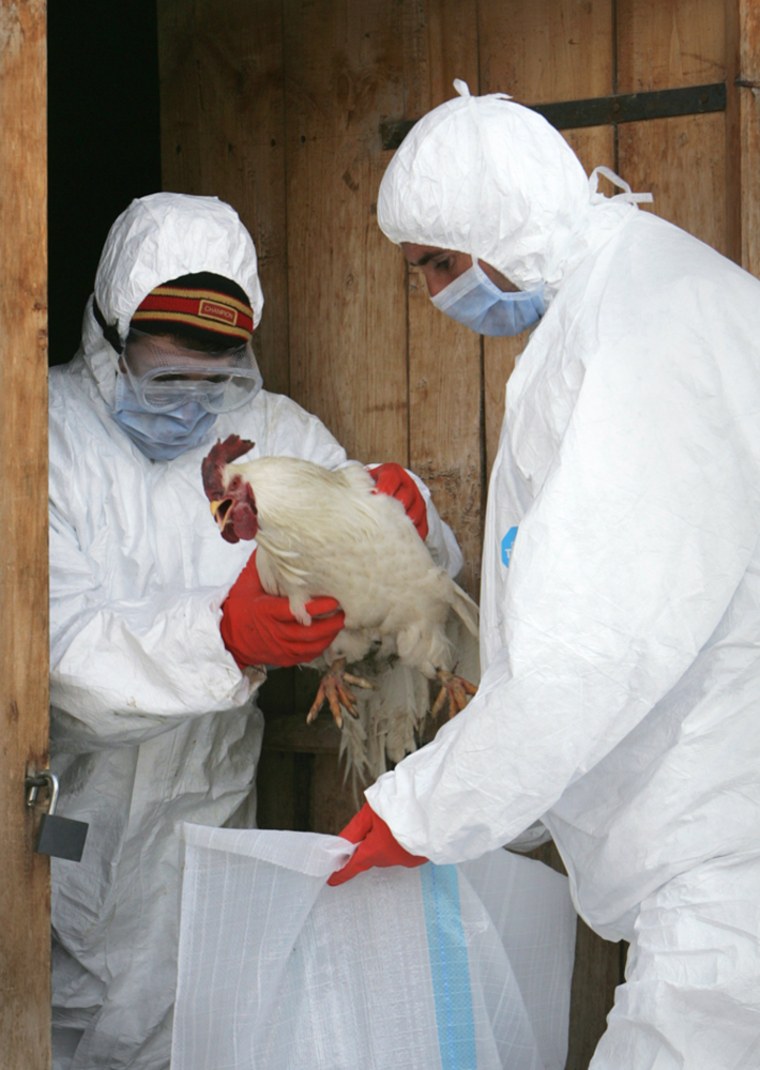Turkey’s agriculture minister accused several neighboring countries Friday of concealing bird flu outbreaks and hampering efforts to prevent the spread of the disease.
Preliminary tests indicate that 21 people in Turkey have been infected with the deadly H5N1 strain of bird flu, including four children who died.
The country has reported confirmed or suspected H5N1 outbreaks in poultry in 26 provinces, including areas a few miles away from the borders with Armenia, Iran, Iraq, Syria and Georgia. Turkey also borders Bulgaria and Greece.
“We know through unofficial channels that the disease exists ... in neighboring countries, which are ruled by closed regimes,” Agriculture Minister Mehdi Eker said during a meeting with governors of Turkey’s 81 provinces. “These countries do not officially declare the existence of the disease.” He did not name the countries.
“This is something that we need to be careful about,” Eker said, urging governors of border provinces to be especially vigilant.
Syria rejected the accusation, saying it had taken precautionary measures to prevent the disease’s spread, including imposing a two-month ban on the import of fowl from all countries and tightening border controls.
“Syria is free from bird flu despite allusions from Turkey that neighboring countries are hiding that there have been some infections,’ Syrian Agriculture Minister Adel Safar said.
On Monday, the U.N. Food and Agriculture Organization warned bird flu might have already arrived in countries bordering Turkey, urging authorities in those nations to step up efforts to detect possible outbreaks.
The FAO, however, has no evidence of any outbreaks in Turkey’s neighbors, said Juan Lubroth, a senior officer at the Rome-based agency’s animal production and health division. A joint team from the World Health Organization and the World Organization for Animal Health will visit the region next week to assess the needs of Turkey’s neighbors and “get a sense of whether they are on top of it or not,” Lubroth said.
The team will visit Iran and Egypt and was setting up trips to Syria and the Caucasus countries.
Turkey takes action
As part of efforts to control the outbreak in poultry, Turkey’s government has imposed quarantines, destroyed 1.1 million fowl and launched campaigns warning people to avoid contact with sick birds, Eker said.
By killing birds, Turkey hopes to limit contact between people and poultry in this largely rural country where most villagers raise chickens, turkeys and geese.
The WHO said Thursday it expected fewer people to become infected with bird flu in Turkey. Most of the cases in the country thus far have involved children and teenagers.
Experts fear the virus could mutate into a form spread easily among humans, triggering a pandemic capable of killing millions. The virus has killed at least 79 people in east Asia and Turkey since 2003.
Experts on infectious diseases from the U.S Agency for International Development visited Erzurum, eastern Turkey, on Friday as part of a tour of affected areas to assess how Washington could help the country.
“We are here to learn about what is happening and what has been done and to see how the United States, a strong friend and ally of Turkey, can assist,” Ann Derse, the head of the delegation, told reporters.
On Friday, Deputy Prime Minister Abdulatif Sener announced new measures to help the poultry industry, which has seen a 70 percent plunge in sales since the crisis started. The $3 billion industry employs 100,000 people.
The measures include compensating professional poultry farms for the destruction of 14 million old chickens that no longer produce eggs. Killing the chickens will cost $11.5 million.
The government will also defer debt, tax, social security and electricity payments, Sener said.
Authorities have urged people not to stop eating chicken and eggs from professional poultry farms, saying the disease has been confined to birds raised in the open in people’s gardens.
